Pool Resurfacing Options & Surface Preparation with Dustless Blasting
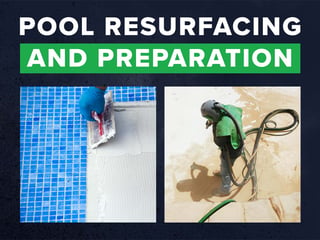
Do you have a swimming pool project that requires resurfacing work? There are a variety of different pool resurfacing options available on the market, and it's important to know the advantages and disadvantages of each including cost, durability, style options, and required maintenance.
If you’re working on refinishing a client's swimming pool or looking to do it yourself, then read on! In this blog post, we will touch on the large variety of pool resurfacing options available to you and also explain why Dustless Blasting is the ideal surface preparation solution prior to your refinishing work.
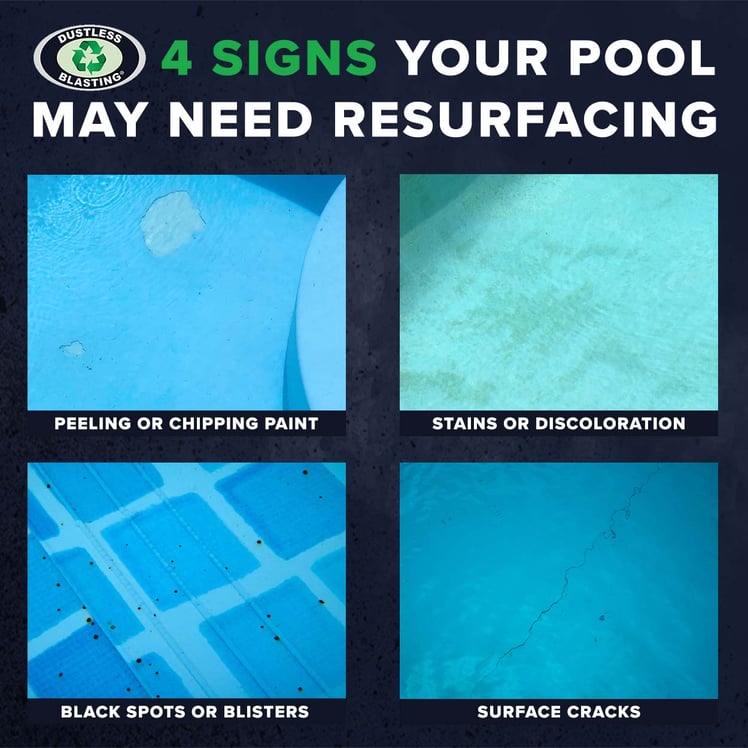
Pros & Cons of Your Various Pool Resurfacing Options
Over time and with normal use, swimming pools can develop cracks, stains, blisters, and other imperfections. If the condition of your in-ground concrete pool project is beyond what can be fixed with general maintenance, then you should look into all of your available resurfacing options. The most common pool finishes are plaster, aggregate, tile, or paint.
Plain Plaster vs. Quartz Aggregate or Pebble Finishes
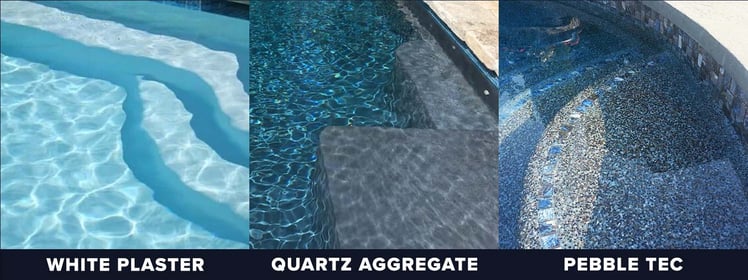
Plain, white plaster finishes remain the most common choice and least expensive material, but pools can also be finished with a quartz aggregate or pebble finish. Quartz pool finishes, like those from Diamond Brite, are generally more durable and are known for being stain resistant, while pebble tec pool finishes have a noticeable slip-resistant texture. Both options add great value to any pool, providing unique color and style, extending the lifespan of the swimming pool finish, and concealing various imperfections.
Replaster vs Paint
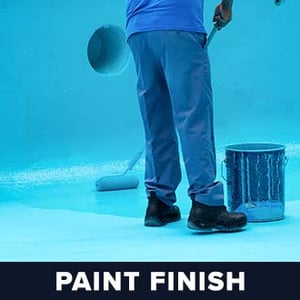
Replastering a pool can be an expensive commitment, but when done correctly, it can last for more than a decade. On the other hand, painting is the much more cost effective option initially but will need to be reapplied every few years. As such, the decision of whether to replaster or paint comes down to you or your client's initial budget and the long-term plans for the swimming pool.
Tile
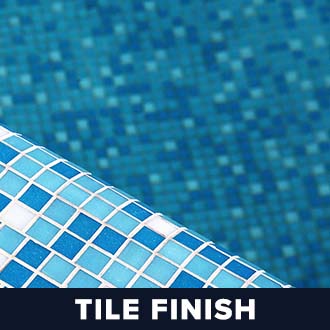
Tiling a pool is becoming more and more popular as it adds lots of dimension and interest to any poolscape. Tile is a long-lasting interior pool finish, boasting a lifespan of over two decades when cared for properly. Tile's also very easy to clean and stands strong in a variety of weather conditions. However, those characteristics also are what make tile finishes one of the more luxurious and expensive options.
proper Surface Preparation is Vital
Before the application of any new coating or finish, the underlying surface, referred to as the substrate, needs to be treated. This process is referred to as surface preparation and is essential when resurfacing a pool because it helps to ensure that the new finish will adhere properly, last longer, look great, and stay safe.
No matter which pool resurfacing option you choose, Dustless Blasting is one of the best surface preparation tools available for the job. It eliminates the need for a labor-intensive acid-washing process, without damaging nearby pool equipment or landscaping; making it a faster, more convenient and eco-friendlier option than traditional methods.
Why Dustless Blasting is the Best Option for Swimming Pool Surface Preparation
Dustless Blasting is a superior surface preparation option for pool replastering jobs compared to more traditional methods like jackhammering or acid washing. Here's why:
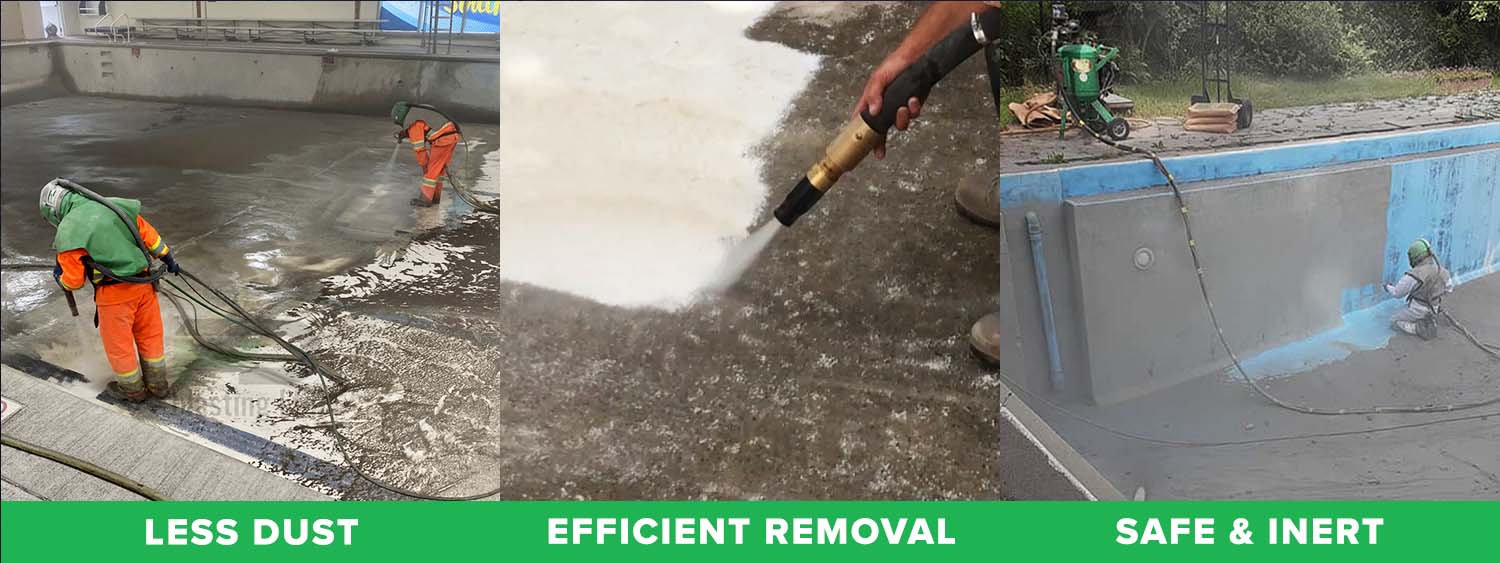
Less Dust and Debris
First, our Dustless Blasting machines are well-known for their unique wet sandblasting method that uses a mixture of water and abrasive media to strip surfaces of contaminants. Due to the water encapsulating the media and debris, this method results in far less airborne dust than jackhammering or dry sandblasting, reducing the risk of property damage as well as any harm to nearby people, pets, or plants.
Efficient Plaster Removal
Secondly, Dustless Blasting can preserve the integrity of the original pool itself by removing only as much plaster as desired - whether it's just a thin layer, exposing a fresh, clean substrate to which a new coating can adhere, or all of it, leaving behind just the original concrete shell.
Safe & Eco-Friendly
Finally, Dustless Blasting is a more environmentally friendly solution to preparing your pool project for refinishing. Applying acid washing can be a dangerous undertaking, as it requires the handling of hazardous chemicals. Additionally, if not managed responsibly, the wastewater from this process can have detrimental effects on the water chemistry of your swimming pool or the surrounding landscape. On the other hand, Dustless Blasting machines are equipped to use a variety of eco-friendly, landscape-safe abrasives like crushed glass and MaxxStrip.
Trust Your Pool Surface Prep to Dustless Blasting
In conclusion, pool resurfacing can be a great way to upgrade a backyard oasis. And when it comes to prepping the surface for refinishing, Dustless Blasting is one of the best tools available – offering efficient and mess-free cleaning without damaging nearby landscaping or equipment. So, if you've got a pool resurfacing project in the works, Dustless Blasting is worth considering as it can provide an ideal solution for prepping surfaces prior to repainting or plastering.
Thanks for reading this blog post on pool resurfacing options and the importance of proper surface preparation! We hope that it has been informative and helped you understand why Dustless Blasting is our preferred choice for prepping pool surfaces prior to refinishing. Now that you know all about the advantages of Dustless Blasting when it comes to prep work for pools, contact a local Dustless Blasting service provider near you or download our free catalog for pricing information.
There's quite a bit to consider when resurfacing your pool. If you're looking more more information, our ultimate guide to pool resurfacing can help!
